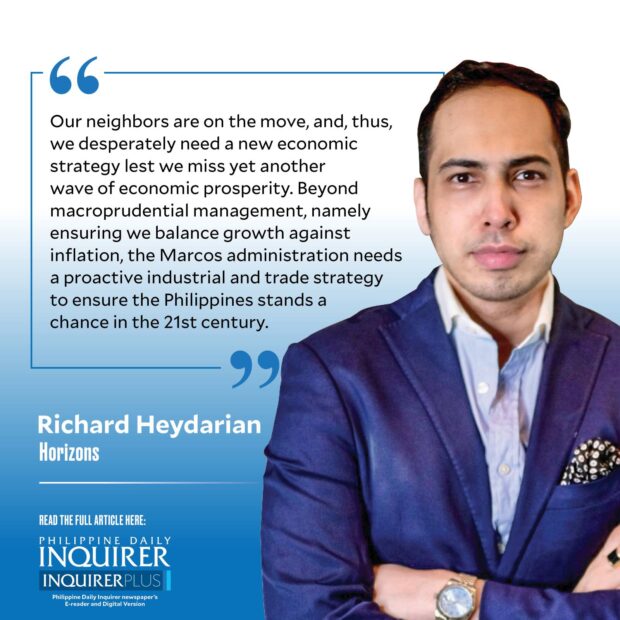Marcos needs a new nat’l economic strategy
Earlier this month, I had the privilege to speak at the plenary session of the Association of Southeast Asian Nations (Asean) Business and Investment Summit in Jakarta, Indonesia. As always, I welcomed the panel discussion as an opportunity not only to forward a Filipino perspective but also to contribute to the intellectual blueprint for a more resilient and dynamic Asean.
Determined to ensure that I make the most out of my stay, I spent some time walking across Jakarta’s central business district and, a few miles beyond, even visiting the Fiba World Cup events in the nearby Indonesia Arena.
Article continues after this advertisementWhat I saw was a global metropolis exuding confidence and relishing an increasingly modernized public infrastructure. Last year, I also had the opportunity to drop by Bali and Jakarta, just as Indonesia was hosting the Group of 20 (G20) summits. In between the two visits to Indonesia, and enjoying their newish airports, I also dropped by Vietnam on multiple occasions for other speaking engagements.
Dear reader, long gone are the days of “Singapore envy,” when our middle class hopelessly drooled over the impeccable infrastructure of the tiny city-state. Today, we might as well envy our actual peers, namely Indonesia and Vietnam, which have not only surpassed us in per capita income but are also rapidly industrializing. Both nations are aggressively courting high-end manufacturing investments. Indonesia is leveraging its market size and massive natural resources while Vietnam is optimizing its proximity to China-based supply chains.
My dear countrymen! Our neighbors are on the move, and, thus, we desperately need a new economic strategy lest we miss yet another wave of economic prosperity. Beyond macroprudential management, namely ensuring we balance growth against inflation, the Marcos administration needs a proactive industrial and trade strategy to ensure the Philippines stands a chance in the 21st century.
Article continues after this advertisementIn fairness, President Marcos made a couple of commendable moves on the strategic front. To begin with, he ditched his predecessor’s puerile infatuation with authoritarian superpowers in favor of robust ties with tried-and-tested allies. Crucially, he has also reached out to nontraditional partners and new middle powers, ranging from South Korea and India to Vietnam, the United Arab Emirates, and Iran, in order to enhance our maritime and food security.
During the Asean Summit earlier this month, Mr. Marcos made one particularly remarkable intervention, where he “firmly reject[ed] misleading narratives that frame the disputes in the South China Sea solely through the lens of strategic competition between two powerful countries,” since this “not only denies us our independence and our agency, but it also disregards our own legitimate interests.”
Despite a plethora of foreign visits, where Mr. Marcos secured billions of investment pledges, there is still little sign that the Philippines is being taken seriously by global investors. According to the Bangko Sentral ng Pilipinas (BSP), net foreign direct investment inflow fell by 34 percent over the past year.
Although the Philippines is in a strategic sweet spot, it’s still more treated as a “New Pearl Harbor” by our allies, who are primarily interested in expanding their military presence on our soil to check China’s ambitions, than an investment destination.
In contrast, neighbors such as Vietnam are not only hosting top foreign leaders such as US President Joseph Biden, but also gathering senior executives from top tech companies such as Intel, Amkor, Google, GlobalFoundries, Marvell, and Boeing, who are rapidly expanding their investment footprint in the region.
As for Indonesian President Joko Widodo, he has personally hosted tech titans such as Elon Musk in a bid to attract high-tech investments, upgraded the country’s mining sector, and oversaw the rapid expansion of the country’s manufacturing sector via Japanese, South Korean, and Chinese investments.
With the advent of artificial intelligence expected to upend the business processing outsourcing industry, the Philippines desperately needs new growth engines. In tandem with forward-looking Filipino business titans such as the Aboitizes and Ayalas, Mr. Marcos should actively create the environment for manufacturing and high-tech investments in the Philippines.
Perhaps, it’s also high time for him to personally meet and host Big Tech executives, who have largely overlooked the country. In short, the Philippines will have to go big or risk getting stuck in low-equilibrium development for the rest of the century.
—————-

















